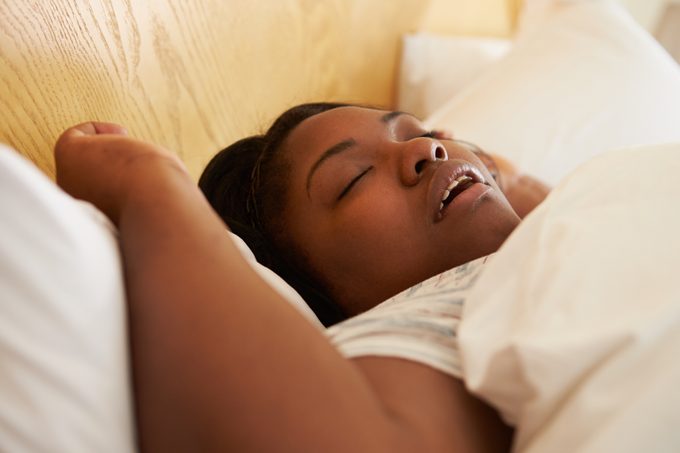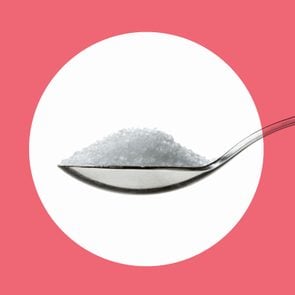Here’s Why You Get Dry Mouth at Night
Updated: Apr. 15, 2022
From not drinking enough water throughout the day to sleeping with the AC on, there are many reasons why dry mouth can be worse at night. Here's how to set things right.
A nighttime annoyance
You wake up parched and quickly reach for that glass of water on your nightstand.
Sound familiar? Waking with cottonmouth, or dry mouth at night, can be more than just an annoyance—especially if it occurs regularly.
And there are many reasons why xerostomia (the medical name for dry mouth) may be worse at night, says Erich P. Voigt, MD, an associate professor of otolaryngology, head and neck surgery at NYU Langone Health in New York City.
Dry mouth occurs when your salivary glands aren’t producing enough saliva to keep your mouth wet.
“Saliva is very important for a healthy mouth,” says Blake M. Warner, DDS, PhD, MPH, an assistant clinical investigator and chief of the salivary disorders unit at the National Institute of Dental and Craniofacial Research of the National Institutes of Health in Bethesda, Maryland.
“It moistens and breaks down food, washes away food particles from the teeth and gums, and helps people with swallowing,” he says.
In addition, saliva contains minerals such as calcium and phosphate that help keep teeth strong and fight tooth decay.
Why is my mouth so dry at night?

There are many potential causes of dry mouth, including medications such as antihistamines, decongestants, antidepressants, blood pressure-lowering pills, and underlying health conditions such as uncontrolled diabetes or Sjogren’s syndrome.
It can even be a symptom of Covid-19. All these things could lead to nighttime dry mouth, too. Note that dry mouth can happen to anyone, occasionally. For example, it may occur when you are nervous or stressed, Dr. Warner says.
“However, when dry mouth persists, it can make chewing, swallowing, and even talking difficult,” he says. “Dry mouth also increases the risk for tooth decay or fungal infections such as thrush in the mouth because saliva helps keep harmful germs in check.”
Other symptoms of dry mouth include:
- Altered taste
- Intolerance for spicy, salty, or sour foods or drinks
- Sore throat
- Cracked lips
- Dry tongue
- Mouth sores
- Mouth infections like thrush
- Hoarseness
- Bad breath
- Cavities
Why is dry mouth worse at night?
According to Dr. Warner, nighttime dry mouth may persist especially because of the following:
- Dry ambient air due to de-humidifiers or air conditioners
- Mouth breathing, or sleeping with an open mouth
- Appliances such as CPAP machines to treat sleep apnea
- Use of sleep-aid medications prior to sleep
- Not adequately hydrating during the day; drinking things that are dehydrating
Dry mouth at night may be a result of drinking too much alcohol, notes Dr. Voigt. Alcohol, like caffeine, can be extremely dehydrating, he says. Dry mouth is a hangover symptom along with headache.
(Here’s how to prevent a hangover while you’re out drinking.)
How to avoid dry mouth at night
Making some simple changes can keep nighttime dry mouth at bay, Dr. Voigt says.
“If your air is dry and you are breathing it in for prolonged periods when you sleep, you will wake with a dry mouth,” he says, noting this is especially true if you are a mouth breather.
The simple solution? Invest in a humidifier for your bedroom to keep the air moist while you sleep, Dr. Voigt says.
What you do during the day can help stave off dry mouth at night, he adds. This starts with trying to drink more water throughout the day. Aim for about eight glasses of water a day.
Sugarless, caffeine-free drinks count, too, and can help keep you hydrated. Caffeinated drinks such as coffee, soda, tea, or energy drinks tend to be dehydrating, so only consume them in moderation.
Other mouth-watering strategies include sucking on ice chips, chewing sugar-free gum, and/or sucking on sugar-free candy, Dr. Voigt says. The artificial sweetener xylitol increases saliva and also works to reduce plaque and tooth decay.
(These are the other natural remedies for dry mouth.)
What not to do
What you avoid is also important, Dr. Voigt says. This includes salty or spicy food, which may cause pain in a dry mouth, or dry, hard-to-chew food, Dr. Warner says.
Smoking tobacco or marijuana and vaping can also contribute to dry mouth. It’s best to kick these habits now or, better yet, never start.
Dental care is especially important if you have dry mouth, Dr. Warner says. The American Dental Association recommends brushing teeth gently at least twice a day with fluoridated toothpaste and flossing daily.
Fluoride helps fight cavities, which are more likely to develop without ample saliva. See your dentist regularly to get a head start on decay.
Other treatment options for dry mouth at night
Sometimes people need bigger guns to re-moisturize the mouth, Dr. Warner says.
Although sugar-free chewing gum, candies, and mints can stimulate saliva, there are two drugs—pilocarpine (Salagen, Eisai, and generics) and cevimeline hydrochloride (Evoxac capsules, Daiichi-Sankyo, and generics)—that can treat dry mouth, Dr. Warner says.
In addition, artificial saliva, saliva substitutes, and mouth moisturizers are available with or without prescription, he says.
Getting rid of dry mouth for good begins with figuring out what is causing it.
If an underlying condition like diabetes is responsible, getting diabetes under tighter control will likely reduce dry mouth, notes the American Diabetes Association.
“Dry mouth is not a normal part of aging. If you think you have dry mouth, see your dentist or doctor to find out why your mouth is dry,” Dr. Warner says.
Next, check out the unexpected reasons you’re always thirsty.


















